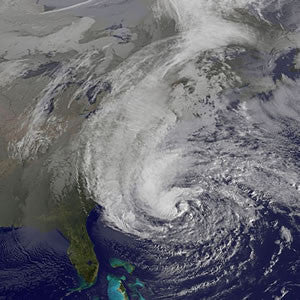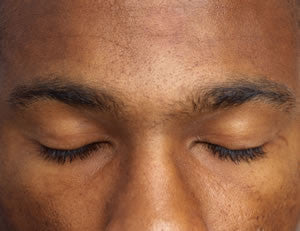Ten Things That Will Help You Manage The Stress Of A Hurricane
Having lived through many hurricanes and recently through Hurricane Irene, I can tell you that the stress we are all feeling right now is different from the stress we might experience in a traffic jam, at work or in school. This is a kind of low-level stress that builds slowly and doesn't dissipate easily. Different from acute stress (the more common variety) which comes on fast and dissipates quickly, this stress slowly raises your blood pressure and heart rate and gradually increases muscle tension over a period of days, or in a prolonged crisis, over weeks and sometimes months.
Stress is related to loss of control and unfortunately, we have very little control over the weather. Major storms like this test us to the limit because we have to give up control. We can grab a raincoat or an umbrella, but beyond that we're powerless to stop whatever is going to happen next.
 People try to exert SOME SENSE of control by buying things like water, flashlights, batteries, generators, candles and of course enough food to feed an army, because, quite frankly, these are things we CAN control. And some of us start to panic a bit, especially when we go to places like Home Depot and Lowes where generators, sandbags and other storm-related paraphernalia have been sold out for days. This makes you feel even more like panicking, especially, if you are one of the people who just can't justify buying a generator or wouldn't know what to do with one even if you could. Still, if other people are rushing to get these items, why shouldn't we?
People try to exert SOME SENSE of control by buying things like water, flashlights, batteries, generators, candles and of course enough food to feed an army, because, quite frankly, these are things we CAN control. And some of us start to panic a bit, especially when we go to places like Home Depot and Lowes where generators, sandbags and other storm-related paraphernalia have been sold out for days. This makes you feel even more like panicking, especially, if you are one of the people who just can't justify buying a generator or wouldn't know what to do with one even if you could. Still, if other people are rushing to get these items, why shouldn't we?
Getting prepared for the storm and preparing early, not only makes perfect sense, it can lower your stress levels too. Once you've taken all the safety precautions you possibly can, you just have to accept whatever happens next is not under your direct control. Lyndon Johnson once famously said that being president was like being a jackass caught out in a hail storm. "Sometimes you have to just hunker down and take it." Well you're inside, sheltered from the storm, so you're one step ahead of the Jackass, but to some degree you are still going to have to accept the fact that all you can really do is hunker down and take it.
 Even though you will be relatively safe inside your house, your stress levels will undoubtedly rise as the wind starts to whip and whirl about your house or apartment building. No matter where you are, you will be fighting a battle INSIDE your head as the storm passes by OVER your head. There are certainly good reasons to be nervous, and you may have to take certain additional precautions during the storm like moving to a safer area of the house or apartment building. But there are lots of good reasons to believe that everything is going to be fine and YOU are going to be fine, so keep forcing this realistic thought - into the forefront of your mind no matter how loudly the wind begins to howl.
Even though you will be relatively safe inside your house, your stress levels will undoubtedly rise as the wind starts to whip and whirl about your house or apartment building. No matter where you are, you will be fighting a battle INSIDE your head as the storm passes by OVER your head. There are certainly good reasons to be nervous, and you may have to take certain additional precautions during the storm like moving to a safer area of the house or apartment building. But there are lots of good reasons to believe that everything is going to be fine and YOU are going to be fine, so keep forcing this realistic thought - into the forefront of your mind no matter how loudly the wind begins to howl.
You really have to think of "weathering" this storm like you would if you were running a marathon because you're truly in it for the long haul. You don't want to allow the pre-storm hype or ANY hype fool you into getting one bit MORE stressed than you need to be to survive this situation. Really focus on NOT getting sucked into the hype either before the storm or during it. You need reliable information, not endless hyperbole. Try going to bed early before the storm starts and catching up on sleep if you can. And please, don't allow yourself to get stressed on a perfectly beautiful day when the storm still days away. Key into the fact that you are fine and the weather, for the time being is STILL fine but still do whatever it is you HAVE to do to get ready.
Once things start blowing, here are TEN additional ideas that will help you cope:
-
Take a deep breath. When you start feeling anxious just take a few slow deep breaths until your anxiety lets go a bit.
-
Realize that this is not going to last forever. Tell yourself: This is all going to be over in two or three days: In three days the sun is going to be shining right on this spot where it is overcast and rainy right now.
-
Do anything to distract yourself. Watch a movie, listen to relaxing music on head phones or read a book. If you don't have power try reading by candle light or meditating (see #7 below).
-
Don't watch any more news than you have to in order to stay abreast of the situation. Remember your news channel has an interest in attracting viewers and not necessarily in being objective about the severity of the storm. Don't join the stress parade by listening to other people stress about the storm. Check a few reliable sources and then, unless you are really in a dangerous place and need to move for your safety, trust that YOU WILL BE SAFE AND SOUND and ACT accordingly.
-
Make up a list of five things you have to be grateful for in spite of the storm. Memorize it for comfort.
-
Get exercise. If there's any way to exercise in the house or apartment, including doing a little bit of yoga, sit ups, pushups or jumping rope, go for it. Exercise ultimately relaxes you after the exercise is over. Take little 15 minute breaks to do this whenever you can.
-
Notice your own breathing. Instead spending your idle time worrying, carefully study every single breath you take for some length of time, say 10-20 minutes or more. Notice every in breath, every out breath and the gap in between each breath. This will eventually calm you down.
-
Realize that you may be thinking irrationally about things, because your heightened sense of stress is challenging your brain's ability to think clearly. Accept that this may happen and notice when you think you might be making a poor decision, or unnecessarily causing yourself to worry just because your stress levels are elevated. Usually this kind of stressful thinking is repetitive, exaggerated and based on partial truths.
-
Observe your own anxiety levels during the storm as if they belonged to someone else. Just detach from them long enough to notice any fluctuations you might experience during the storm. Believe it or not: You are NOT your anxiety. You are the awareness that sees that anxiety and can cultivate calm below the anxiety. It's the calm BELOW the storm.
-
Be practical: Ask yourself: How am I doing right now? If AT THIS MOMENT, you are safe and warm, acknowledge that fact, don't just slough it off and savor it.
 Having a tendency toward anxiety gave our prehistoric ancestors an evolutionary advantage that helped them survive and thrive in ancient times. Preparing for winter, watching for a snake in the grass, and outwitting a predator allowed our ancestors to pass on these anxious genes to us. Nowadays this genetic propensity toward anxiety isn't always so useful. But here is one of those times in our modern day life where a little bit of anxiety is going to help keep you safe from the storm. It's what makes you want to curl up in a corner of your bed and pull the covers up to your nose. There's nothing wrong with that instinct. Let it help get you ready for the storm and be grateful for its existence.
Having a tendency toward anxiety gave our prehistoric ancestors an evolutionary advantage that helped them survive and thrive in ancient times. Preparing for winter, watching for a snake in the grass, and outwitting a predator allowed our ancestors to pass on these anxious genes to us. Nowadays this genetic propensity toward anxiety isn't always so useful. But here is one of those times in our modern day life where a little bit of anxiety is going to help keep you safe from the storm. It's what makes you want to curl up in a corner of your bed and pull the covers up to your nose. There's nothing wrong with that instinct. Let it help get you ready for the storm and be grateful for its existence.
But once everything is a secure as you can possibly make it, GIVE THAT OLD ANXIETY A REST!





James Porter
Author